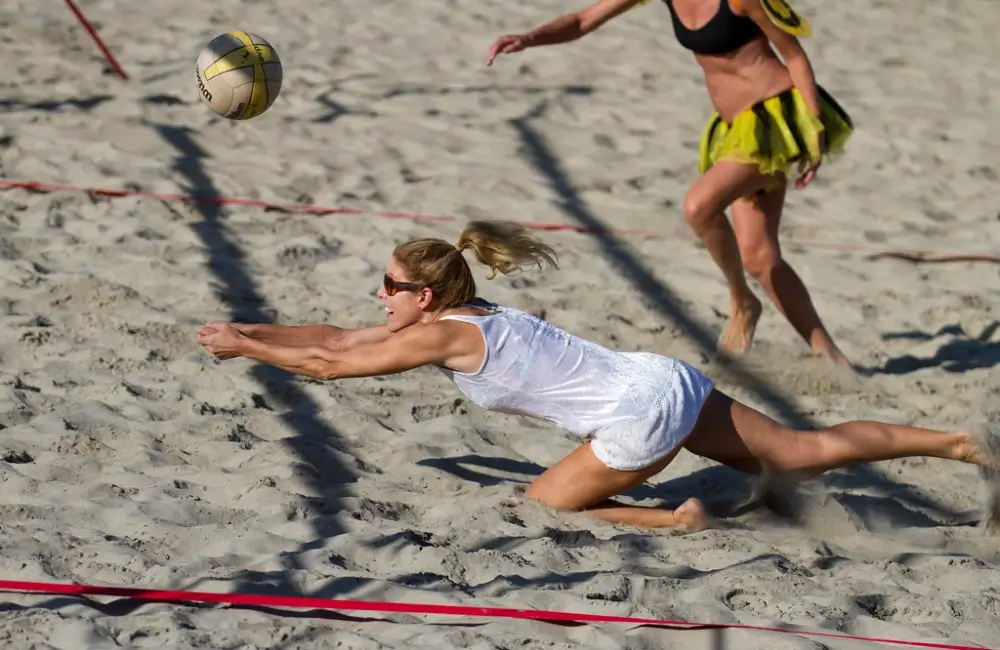Last Updated: January 16, 2024
At the core foundation of any successful volleyball strategy are two important things i.e., diving and digging. They help reinforce the team’s defense and form a key foundation for a winning strategy.
In a nutshell, good digging and diving is key for preventing the opponent from scoring, especially by enhancing ball retrieval and control. At the same time, the techniques can help prolong the rally and give your team more scoring opportunities.
Let me look at some ways digging and diving contribute to winning strategies on the volleyball court.
1. Taking Control of the Ball

Both digging and diving are reaction skills as they involve reaching for balls that would otherwise end up as points for the opposing side. Using either of these two approaches, one can reclaim control of the balls even after heavy spikes or dodges. This contributes to the overall winning strategy by denying the opponents some decisive points.
If well implemented, these techniques can result in high-quality passes that the setter can eventually transform into scoring opportunities for your team.
2. The Backbone of the Game
A team with good defense has a strong backbone and can literally withstand any onslaught. Good diggers and divers are invaluable when it comes to stopping powerful spikes or redirecting tricky serve shots. It is extremely important that a team has this kind of foundation in order to take charge of the momentum of the game.
It doesn’t matter how well your attackers perform. As long as your digging skills are weak your team will not be able to ward off attacks or even have comebacks. That alone significantly affects your winning chances.
3. Higher Transitioning Rate
Transitioning in volleyball refers to the process of switching from defense to offense and vice-versa. For the diggers and divers that means being hot on the heels of the opponent’s attack moves. It also means regaining the momentum of the game and smoothly advancing from defensive to offensive play.
Normally, the smoother the transition rate is, the better. Worth noting is that a smooth transition is sometimes all it takes to keep a team’s energy and hopes high – playing a huge role in building motivation.
4. Counterattacking Opportunities
Good defense and counterattack go hand in hand. Solid defense ensures you gain control of the ball thereby providing a solid foundation for initiating counterattacks.
A well-organized team with great digging and diving ability is essential for ensuring quick transitions from defense to attack. This way, you can maximize the chances of catching the opposing team off guard.
This rapid transition and an offensive mindset are sometimes all it takes to take control of the ball as you get to capitalize on moments of disarray in the opponent’s side.
Recommended read: 10 Drills to Improve Your Digging and Diving Proficiency
5. Time Management
Time management is yet another major part of volleyball that benefits from good digging and diving techniques. For example, when you put up a strong defensive approach your team can enjoy extended rallies which, in turn, prolongs the time it takes to score a point. Assuming your team is leading, this gives you the power to control the clock and secure the win.
Good time management is also essential for minimizing errors. It helps your players to be composed and to have time to study the opponents.
In a nutshell, digging and diving contribute to winning strategies by giving your team an upper hand in time control.
6. Psychological Impact
A few successful digs are sometimes all it takes to create a significant positive impact on your team’s psychology. When your team successfully deals with spikes and tips, it boosts your confidence. Knowing that they can successfully tame the opponents increases their chances of self-assuredness and instills a sense of belief.
This high level of confidence can carry over to other aspects of the game and lead to higher winning outcomes.
What’s more, strong digging skills can demoralize and frustrate the opposing team. This happens especially when the opponent’s attacks are repeatedly thwarted. A significant reduction of morale in the opposing team can give your team a huge advantage.
7. Wide Variety of Winning Strategies
A strong defense gives your team access to a wider variety of scoring opportunities. A weak defense does the exact opposite. Ordinarily, a team that lacks good diggers has to rely solely on serving and blocking to land points. On the other hand, a team can enjoy extra scoring opportunities from ball retrievals and counterattacks.
As a coach, this gives you more winning strategies, and with that comes extra opportunities to shine.
Also read: From Novice to Pro – How to Become a Digging and Diving Maestro
8. Lower Risk of Error
A good combination of digging and diving provides your team with a much-needed safety net for optimal performance. As such, this takes pressure off your frontline leaving your attackers with more leeway to take calculated risks and engage their creativity.
Offensive players tend to take uncalculated risks when they realize the defense has fallen apart – this can lead to a higher error rate.
Also, when you have your defenders creating top-quality passes, it becomes possible for the rest of the team to launch better attacks.
Overall, a strong combination of digging and diving contributes to a team’s winning strategy by reducing the error rate.
9. Lower Risk of Fatigue or Injury
Missing or low-quality digging ability often means that other members of the team have to play on overdrive to keep the team in the game. This, unfortunately, increases their rate of work – something that could lead to higher-than-normal fatigue levels and even injury.
Related: Developing Good Digging and Diving Training Routine
This can affect your team’s long-term prospects over the course of a season.
Conclusion
Defensive domination is an essential ingredient in the running of a strong and cohesive volleyball team. Coaches should, therefore, spend more time training and assessing their team members on these areas and particularly emphasizing their importance in the team’s overall winning strategy.
Ultimately, the goal should always be to create a well-rounded team and to be always ready for different challenges and situations.
